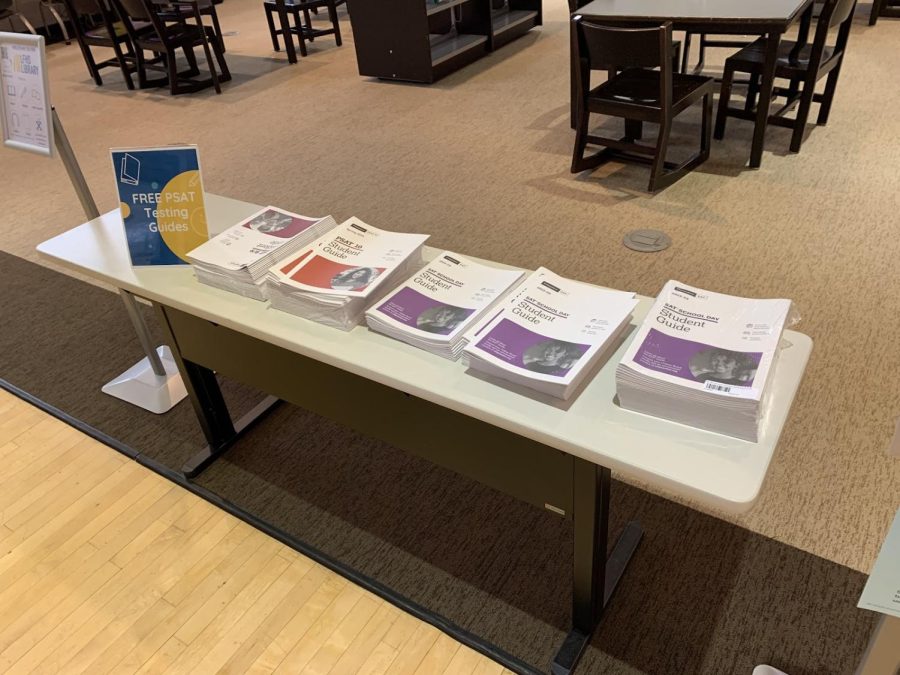How to: Prepare for and take the SAT
SAT prep books in the library
April 10, 2023
Find the time to study
Although this might seem obvious, many students will often struggle to find the motivation to hit the books after being in school all day. The best way to counteract this is to study on a weekend, preferably Sunday.
There are many companies that offer SAT practice books to help you study. It doesn’t even have to be a huge session. If you have an hour or two in your day free where you’re not doing anything, pick up the book and take a couple short practice tests.
This might seem like a lot to some people, but putting in any sort of effort over time will build your comprehension skills, and it will improve your overall test-taking ability. This will help you get used to the format of the test, remember what kinds of questions are asked, how things are worded to trip you up, and allow you to track your pace.
Be consistent
If it’s difficult for you to find time in your schedule during a busy week, don’t be discouraged. You’ll find that sticking with it is very rewarding in the end.
In terms of the practice tests themselves, my best advice is to treat it like the real test. Keep a timer on your phone or watch to keep yourself on time, and be strict. One of the most important factors to keep track of on the SAT is your timing. The more you practice, the more familiar you are with the test, and the more prepared you’ll be.
If you find yourself stuck on a question that is taking longer than usual, don’t dwell on it too much and keep moving. It’s about timing, not time. There might be questions on the test that you don’t know how to solve. Keeping a consistent pace is key to taking a good test, allowing you ample time to solve the harder questions and enough time to get the easy ones right.
Remember, the easy ones add up, so it’s better to get 20 easy questions right than to be stuck between “A or C” on a harder question and miss out on the rest of the test.
I suggest even using the same calculator on the practice as the real test just so you’re extremely familiar and comfortable with all your materials so that your real test experience is as least stressful as possible.
At the end of a section, take a five to ten minute break and clear your mind so you don’t burn yourself out.
When you finish for the day, go back and check your answers to see which ones you got wrong. This will help you learn which sections you might need to work on, and it’s a good opportunity to see what you can do to get it right the next time.
Helpful Techniques
Taking the actual test can be a skill in-and-of-itself. Something that I found especially useful for the reading portion was annotating as you go.
Underlining words that you might not be familiar with because they might ask you the definition, and also circle important parts of the passage that you think might come up later can come in handy.
Marking it away for later saves a lot of time because you aren’t constantly going back to the text and scrounging for that one sentence that will give you the answer.
Another trick that I recommend is to circle all of your answers on the test booklet, then go back at the end and fill all the bubbles in on your scantron.
It takes a lot of time to fill in each individual bubble, so doing that in the end can save you more time for answers.
Staying on the test booklet keeps you in the zone, and allows you to move to each question much faster and keep your brain focused on the material instead of having to break every 30 seconds.
Just make sure to give yourself sufficient time to fill in your scantron at the end, though, so you don’t accidentally circle the wrong one.
If you decide to skip a question, make a note of it so that you remember to go back. Another thing that I did before I took my SAT was read any book for at least 10 minutes right when I woke up. Since you’re already waking up so early to take the SAT, it’s very important to wake your brain up and get it into gear.
This is specifically useful for the reading portion since reading is the first section of the test. I found that it really allowed me to read more fluidly and with higher retention.Finally, make a list of the things you want to remember before the test, and then look at it before you take the test.
This could be anything from various math formulas that will be helpful to things you want to remember to other techniques.
Before you go in
The night before you take the test, RELAX.
It’s natural to find yourself in a very stressful position, trying to cram in as much information as possible. The best thing you can do is calm down, take a deep breath, and have faith in your ability.
As long as you have given yourself enough time in advance to prepare, you have nothing to worry about.
Get all your materials: pencils, calculator, water bottle, snacks, sticky notes, erasers, school ID, testing ticket, and good attitude ready.
Go to bed early to leave yourself plenty of time in the morning to wake up and get ready. Don’t just settle for an energy bar, eat a good breakfast. You will have a bad time if you’re starving, so give your brain the fuel it needs.







